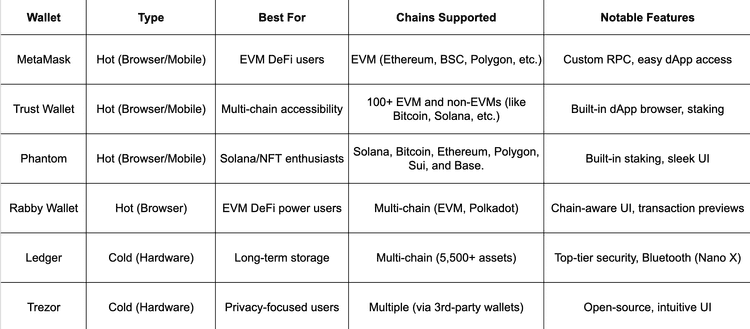The ultimate guide to choosing a crypto wallet: Everything you need to know


As the crypto world continues to expand, choosing the right wallet is one of the first and most important steps you'll take. A crypto wallet isn’t just a place to store your digital assets—it’s your gateway to DeFi, bridging, staking, and beyond. But with so many options available, from mobile apps to hardware devices, picking the best one for your needs can feel overwhelming. This guide breaks down everything you need to know to make an informed decision.
What is a crypto wallet?
Before diving into specific wallets, it's essential to understand what a crypto wallet is and why it's foundational to any crypto activity.
Understanding the purpose of a crypto wallet
A crypto wallet is a digital tool that allows users to store, manage, and interact with their cryptocurrencies. It doesn’t actually hold coins like a physical wallet but instead stores the private keys that grant access to the digital assets on a blockchain. Without a crypto wallet, you can't send, receive, or securely store your crypto. Some modern wallets also allow you to interact directly with decentralized applications (dApps), making them more than just a storage solution.
Types of crypto wallets: Hot wallets vs. cold wallets
Crypto wallets come in two primary categories: hot wallets and cold wallets. Hot wallets are connected to the internet, making them convenient for frequent transactions. Examples include mobile apps, browser extensions, and web-based wallets like MetaMask or Trust Wallet. Cold wallets, on the other hand, store your keys offline and are considered more secure. Devices like Ledger and Trezor fall into this category, ideal for long-term storage and large holdings.
Key factors to consider when choosing a crypto wallet
With so many wallets available, evaluating them based on certain core factors can help narrow your choices and align your selection with your crypto goals.
Security features to look for in a crypto wallet
Security should be your top priority. Look for wallets that are non-custodial (you own the keys), offer strong encryption, and allow for backup and recovery options like seed phrases. Advanced options like multi-signature support, biometric authentication, and open-source code for transparency are also valuable. Some wallets are even experimenting with smart contract or MPC-based security setups, eliminating the need for traditional seed phrases.
Compatibility with different cryptocurrencies and blockchains
Before choosing a wallet, make sure it supports the cryptocurrencies and blockchains you plan to use. Some wallets, like Trust Wallet are multi-chain and support a wide variety of tokens. Others may support fewer networks, like Phantom, Rabby Wallet, or MetaMask for Ethereum-compatible chains. A more compatible wallet gives you access to DeFi, NFTs, and token swaps across ecosystems, without switching wallets constantly.
Mobile vs. desktop vs. hardware wallets
Mobile wallets are ideal for daily use and quick transactions. They usually offer intuitive interfaces and features like QR scanning and push notifications. Desktop wallets provide deeper features and enhanced management, while browser extension wallets are tailored for dApp interaction. Hardware wallets are the most secure option, perfect for cold storage. Some wallets, like Rabby, blend mobile and browser functionalities for a flexible experience.
Custodial vs. non-custodial wallets
Custodial wallets are managed by a third party (like exchanges), meaning you don’t control your private keys. They're easier for beginners but carry higher risk if the provider is compromised. Non-custodial wallets give full control and responsibility to the user. If privacy and decentralization matter to you, non-custodial is the way to go.
Comparing some popular crypto wallets
Each DeFi wallet has unique strengths, so your choice depends on your goals—whether you prioritize security, accessibility, or asset diversity.
MetaMask
A widely used browser extension and mobile wallet for Ethereum and EVM-compatible chains. Known for its ease of use and integration with DeFi platforms. MetaMask also allows custom RPCs and token additions, giving users control over what networks they interact with.
Trust Wallet
A mobile wallet that supports multiple blockchains and thousands of tokens by using infrastructures like Rango Exchange. Great for users seeking flexibility. Its built-in dApp browser enhances mobile access to DeFi protocols.
Phantom
Designed initially for Solana users, Phantom is a hot wallet with an excellent user experience and staking features. It now also supports Ethereum, Bitcoin, Solana, Sui, Base, and Polygon, expanding its usability.
Rabby Wallet
A browser-based wallet offering chain-aware transactions and a clean UI, making it ideal for users managing assets across EVM chains. It automatically detects the correct chain before confirming transactions, helping prevent common user errors.
Ledger (Nano X/S)
A leading cold wallet brand offering high-level security and compatibility with various assets through Ledger Live. It provides Bluetooth functionality in the Nano X version, improving accessibility without sacrificing safety.
Trezor
Another popular hardware wallet with an intuitive interface and strong security track record. Its open-source firmware allows public code review, contributing to transparency.

Tips for setting up and safeguarding your crypto wallet
When setting up a wallet, always back up your seed phrase and store it offline. Never share it with anyone. Enable all available security features such as PIN codes, biometric login, and 2FA if possible. For hardware wallets, purchase directly from the official website to avoid tampered devices. Some wallets also offer simplified onboarding through email or social login, but make sure to understand the trade-offs in security. Regularly update your wallet software to patch vulnerabilities.
Conclusion
Choosing the right crypto wallet is a crucial step in your crypto journey. By understanding the types of wallets available, prioritizing security and compatibility, and comparing reputable options, you can confidently manage and protect your digital assets. Whether you're a beginner or a seasoned investor, the right wallet empowers you to stay in control of your crypto securely and efficiently.
Frequently asked questions
Check out most commonly asked questions, addressed based on community needs. Can't find what you are looking for?
Contact us, our friendly support helps!
Are hardware wallets worth it for beginners?
They offer top-tier security, especially for large holdings, but may feel complex for newbies. Use them once you're comfortable with basic wallets.
What is MPC-based security, and how is it different from seed phrases?
MPC (Multi-Party Computation) splits your private key across multiple devices or parties, eliminating the need for a traditional seed phrase. It enhances security by removing single points of failure, often used in smart contracts or institutional wallets.
Are all EVM wallets compatible with the same tokens and dApps?
Generally, yes; But not all wallets support every EVM token by default. You might need to manually import tokens using the contract address. Also, some wallets are optimized for different ecosystems or provide extra features like transaction previews.




